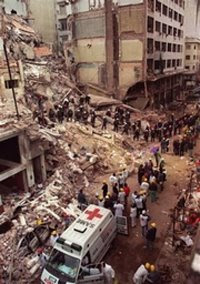Vladimir Putin and Mahmoud Ahmadinejad
*[UPDATE] - Russia says no arms deal with Iran
(SEE BELOW)
Russia is to supply Iran with new S-300 air defense systems, Iranian Defense Minister Mostafa Mohammad Najjar said Wednesday, a sign of growing military cooperation between Moscow and Teheran. “The S-300 air defense system will be delivered to Iran on the basis of a contract signed with Russia in the past,” state television quoted Najjar as saying.
Najjar didn’t say when or how many of the S-300 anti-aircraft missile defense systems would be shipped to Iran. Earlier this year, Russia delivered 29 Tor-M1 air defense missile systems to Iran under a $700 million contract signed in December 2005.
Russian officials wouldn’t comment on the Iranian statement, but the Interfax news agency quoted an unidentified source in the Russian military-industrial complex as saying that a contract for the missiles delivery had been signed several years ago and envisaged the delivery of several dozen S-300 missile systems.
 S-300 Air Defense System
S-300 Air Defense System
The S-300 is capable of shooting down aircraft, cruise missiles and ballistic missile warheads at ranges of up to 150 kilometers and at altitudes of up to 27 kilometers. Russian military officials boast that it excels US Patriot missiles. Rumors about the sale of S-300 missile systems to Iran have circulated for a long time, but Russian officials consistently denied it. Military experts said that the S-300 missile systems could inflict a significant damage to the US or Israeli forces if they were to attack Iran. TOR-M1
TOR-M1
The S-300 is much more powerful and versatile weapon than the Tor-M1 missile systems supplied earlier which were capable of hitting aerial targets flying at up to 6,000 meters.
*The objective of a TMD system is to defend against missile attacks. Such a system might be configured to protect an area as small as a city or port, or as large as several thousand square kilometers. It could provide protection for civilian populations as well as military forces. Providing effective TMD would require a seamless network of early warning sensors, command posts, fire-control radars, and anti-missile missiles, or Integrated Air Defense System (IADS).
Attention Israel and all American operating bases in the area.
Although defensive in nature, the deployment of a TMD system can catalyze threats to international peace and security by upsetting a regional balance of military forces, undercutting other states' deterrent capabilities, or by protecting forces that can be used for offensive purposes. TMD deployment may therefore spur an unstable offense-defense arms race for relative advantage, undermine the prospects for arms control, and exacerbate political conflicts between rival states.
Meanwhile, Russia’s Foreign Minister Sergei Lavrov said Wednesday that the delivery of nuclear fuel to Iran’s Bushehr reactor makes it unnecessary for Iran to continue to enrich uranium.“We believe that Iran has no economic need to proceed with its program of uranium enrichment,” Lavrov told the Vremya Novostei newspaper.
“We are trying to persuade the Iranians that freezing the program is to their advantage as it would immediately lead to talks with all countries of the ’six’, including the United States,” he added. “Iran’s agreement to this proposal is in everyone’s interest,” Lavrov stated. Such talks, he said, would aim to once and for all remove suspicions that Iran’s nuclear program was anything other than peaceful.
Lavrov stressed that all activities at the Bushehr reactor would remain under international supervision. “Our Iranian partners know that should there be the slightest deviation [from agreements], we will freeze our cooperation,” he said. Lavrov’s statements mirrored those made last week by US President George W. Bush, who said that he supported the Russian fuel shipments, stating that they proved that Teheran had no need to enrich uranium.
“If the Russians are willing to do that, which I support, then the Iranians do not need to learn how to enrich. If the Iranians accept that uranium for a civilian nuclear power plant, then there’s no need for them to learn how to enrich,” Bush said.
Meanwhile, senior Israeli diplomatic officials said last week that Moscow had no interest in seeing Iran gain an independent nuclear capability. “The Russians are not naive,” one of the officials said, adding that Moscow wants to keep neighboring Iran from gaining a nuclear weapon. “Our difference is over tactics, not goals,” the official said.
He said this difference in tactics would become clear in January, when the UN is expected to adopt a third Security Council resolution sanctioning Iran for its ongoing uranium enrichment.According to the official, the Russians will back about half of the items in the basket - the less serious ones - and not back others. The Chinese, the official said, are likely to back even fewer sanctions than the Russians.
Herb Keinon and AP contributed to this report.
-------------
[UPDATE]Dec. 28, 2007
MOSCOW, Dec. 28 (UPI) -- The Russian Federal Service for Military-Technical Cooperation denied allegations of an arms deal with Iran regarding air defense systems.
The statement said Russia isn't discussing the delivery of the S-300 interceptor missile system with Iran contrary to media reports, RIA Novosti said Friday.
"The issue of the delivery of S-300 air defense missile systems to Iran, raised by the media, is not a subject of current negotiations and has not been discussed with the Iranians," the statement read.
The United States issued demands to Russia to cease weapons deals with countries Washington views with mistrust.Russian President Vladimir Putin said in October, however, that Russia wouldn't entertain arms restrictions "based on unilateral and politicized assessments".
Russia and Iran negotiated the sale of the 29 Tor-M1 missile defense system in January.
© 2007 United Press International.













































1 comment:
Siren
I come to your blog every day to keep myself well informed.
Post a Comment